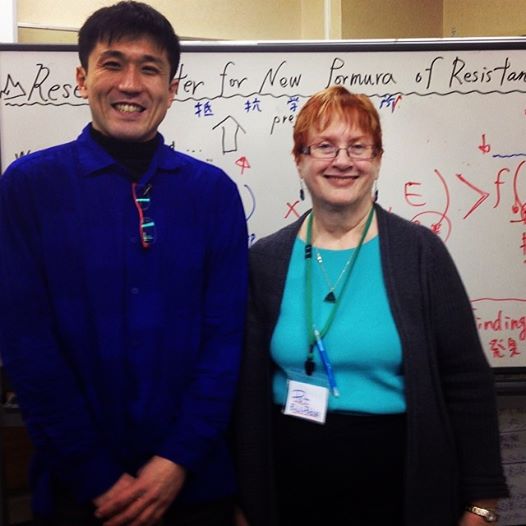組織開発・人材開発の専門知識をどこで学ぶのか?
昨日までNTL(National Training Laboratory)のPat博士によるOD (Organizational Development)Sessionに参加させていただきました。南山大学の中村和彦先生、スタッフの方々が公開講座として主催している公開研究会で、今年で5回目になるそうです。

この会は当初、山梨・清里で開催の予定でしたが、大雪の影響で開催地を変更し、名古屋での開催になりました。スタッフの方々は、大変なご苦労をなさったこと思います。この場を借りて感謝申し上げます。
組織開発についてPatさんから学んだこと、そして、Patさんのファシリテーションの内容は、また別の機会に筆をとろうと思います。
その内容は、自分のケース(バックホームケース)やロールプレイやケーススタディを往還して行われるもので、非常に質の高いものでした。このことは、また別に述べます。
▼
今日述べうることはひとつ。会に参加しつつ、つくづく思ったことです。それは、組織開発のように社会的ニーズが高く、かつ、職業的専門性の高い教育内容に、今後、大学院が対応していくべきではないか、という思いです。
たとえば、Patさんはミシガン大学でRonald Lippitさんのもとで、組織開発のPh.Dを取得して、その後、数十年にわたり、組織開発の実務や研究に従事してきました。彼女のPh.Dは「組織開発」です。
もちろん、組織開発のみならず、人事の世界には、専門家として極めたらよい領域はたくさんあります。人的資源管理、人材開発などはその典型でしょう。実際、そうした専門のMaster Course(マスターならば相当に多い)、Ph.D Course(数は少なくなるが存在はする)は海外には、数は多くはないものの、存在します。少数の専門教員が協働してプログラムを運営しています。
対して、日本の大学院はどうなっているか、というと、「学位の粒度」教育内容が、海外に比べ「包括的」である傾向があります。たとえば、博士(経営学)、博士(教育学)のように、それは学問領域(研究科名)に対応していることが多い傾向があります。
もちろん、職業に関連した高度専門家を養成する米国のプロフェッショナルスクールと、研究者養成を主とする日本の大学院は、同じGraduate Schoolでも、その誕生の由来は全く異なっているので、それらを単純比較することは難しいでしょう。
しかし、人材開発の世界では、海外の場合、相当、専門化が進んでおり、それに従事している人はマスターコースの修了者、場合によってはドクターコースの修了者であることも、希ではありません。
また、彼らは、より粒度の細かい高度な専門知識を大学院で学び、職業に対応した学位を取得してきています。
今後、日本の企業がグローバル化の荒波にもまれていく中で、人材開発の世界も、またその影響を受けるでしょう。そのとき、やはり、専門家として持っている知識基盤が重要になってくるように、僕には思えます。
その際、大学院には何ができるか? そして僕は何がしたいのか? そんなことを帰りの新幹線の中で考えながら家路につきました。
最後に、今回のセッションを実現してくださった、Patさん、南山大学の中山先生はじめ、スタッフのみなさま、セッションで学んだ参加者のみなさまに感謝いたします。ありがとうございました。
そして人生は続く
ーーー
Where can we enhance the expertise of organization and human resource development?
I've participated in the Organization Development(OD) Workshop for 3 days up to yesterday held by Nanzan University. Professor Kazuhiko Nakamura and his staff invited Dr. Pat Bidol-Ladva from National Training Laboratory as a facilitator of this workshop. I really appreciate Professor Nakamura and his staff. Eighteen practitioner and scholars got together from all over the Japan and learned the advanced knowledge of organization development.
Generally, organization development is defined as an ongoing, systematic process of implementing organizational change and enhancing organization effectiveness.
Suppose there is an electricity company whose CEO and top management have to change their company's strategy from using fossil fuel to renewable energy such as solar power and biomass fuel in alinement with changing energy policy of the government. It might be easy to change the strategy on the desk, but is not easy to change the organization and the employee's minds.
Sometimes their lower management and employees might distrust top management, stick to existing strategy and resist the change of operation. An OD(organization development) consultant intervenes the organization from outside of the company as a facilitator and help people implement strategy.
They have interviews with the top management and key persons in order to understand the essential problem and, if necessary, do some social surveys of the organization. They hold strategic meetings for senior management and the campaign progresses down through the lower levels of employees. They hold all-staff conferences in order to create the opportunity for stakeholders to talk about the problem. By this process, they can change the organization gradually.
In this workshop, 18 practitioners and scholars learned the concept and knowledge of OD and experienced some case studies and role play. We learned how to have interviewes with clients, do diagnosis and intervene organizations.
Dr. Pat who worked as the facilitator of this workshop got Ph.D from Michigan University in the 1970s. After that, she has worked for decades as an OD consultant and taught in universities. She is such a charming, skillful and thoughtful facilitator. I've learned so much from her. I really appreciate her.
The following is not directly related to her great work. What I'm interested in is her degree name. She is a Ph. D. of organization development.
In the United States, nobody is surprised at seeing managers of human resource development who hold master-level degrees or doctorate degrees. They holds degrees named for example M.A(Human Resource Development), Ph.D.(Organization Development). Graduate schools in the U.S are professional schools where students get highly developed and work-related expertise and knowledge. The degree name is very specific.
On the other hand, graduate schools of Japan are research-oriented schools where students who want to work as researchers and professors do research. The name of the degrees are comprehensive and correspond to the name of the academic area. For example M.A.(Management) or Ph.D.(Education). They cannot adequately send out people with highly advanced practical and work-relevant knowledge into society.
As I mentioned before, in global companies, the managers who works in human resource development departments tend to hold academic degrees. They learned expert knowledge in graduate school and work as professionals in organizations. The intervention campaigns they plan and implement are very high level. Japanese companies have to compete with global companies.
Of course, research is so important in knowledge economy. Along with the trend, I'm wondering how graduate schools of Japan can cope with this problem and whether we should change or not. And I'm wondering how I should address this area.
My life goes on...
投稿者 jun : 2014年2月21日 08:42











